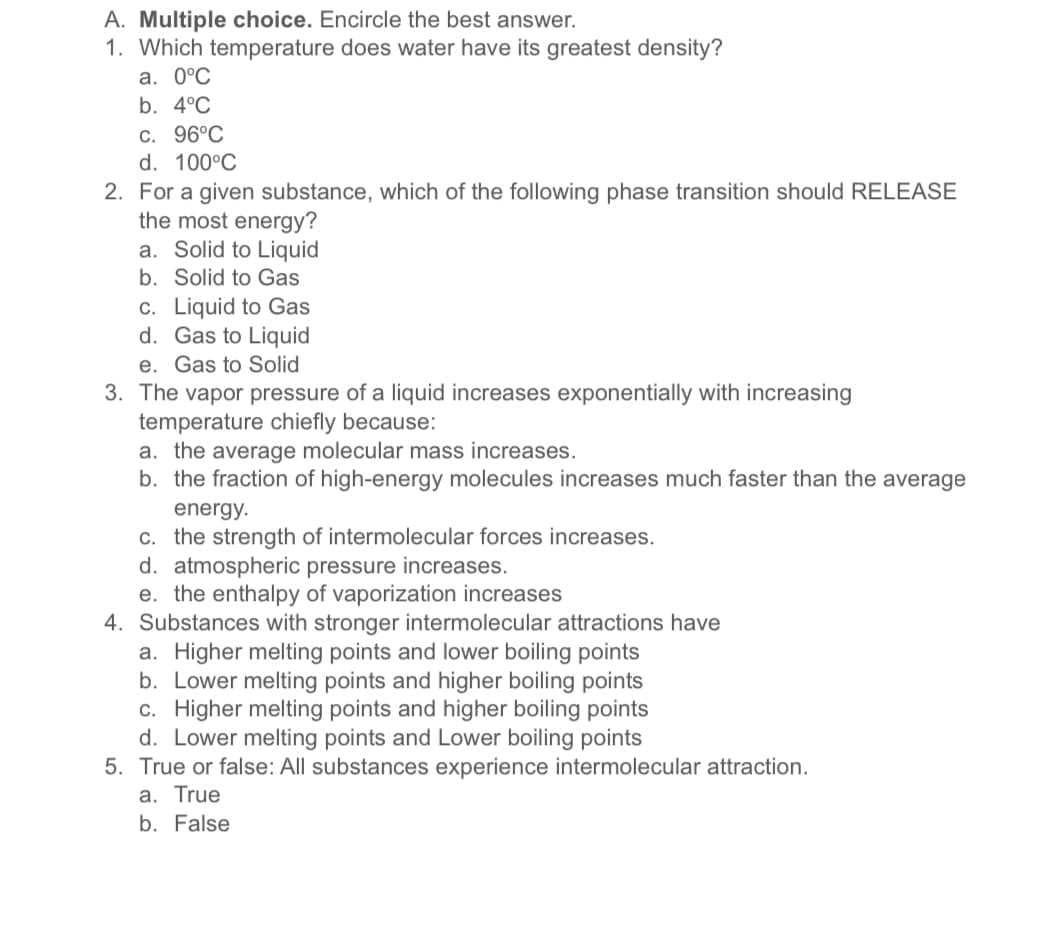A. Multiple choice. Encircle the best answer. 1. Which temperature does water have its greatest density? а. 0°С b. 4°C С. 96°C d. 100°C 2. For a given substance, which of the following phase transition should RELEASE the most energy? a. Solid to Liquid b. Solid to Gas c. Liquid to Gas d. Gas to Liquid e. Gas to Solid 3. The vapor pressure of a liquid increases exponentially with increasing temperature chiefly because: a. the average molecular mass increases. b. the fraction of high-energy molecules increases much faster than the average energy. c. the strength of intermolecular forces increases. d. atmospheric pressure increases. e. the enthalpy of vaporization increases 4. Substances with stronger intermolecular attractions have a. Higher melting points and lower boiling points b. Lower melting points and higher boiling points c. Higher melting points and higher boiling points d. Lower melting points and Lower boiling points 5. True or false: All substances experience intermolecular attraction. a. True b. False
A. Multiple choice. Encircle the best answer. 1. Which temperature does water have its greatest density? а. 0°С b. 4°C С. 96°C d. 100°C 2. For a given substance, which of the following phase transition should RELEASE the most energy? a. Solid to Liquid b. Solid to Gas c. Liquid to Gas d. Gas to Liquid e. Gas to Solid 3. The vapor pressure of a liquid increases exponentially with increasing temperature chiefly because: a. the average molecular mass increases. b. the fraction of high-energy molecules increases much faster than the average energy. c. the strength of intermolecular forces increases. d. atmospheric pressure increases. e. the enthalpy of vaporization increases 4. Substances with stronger intermolecular attractions have a. Higher melting points and lower boiling points b. Lower melting points and higher boiling points c. Higher melting points and higher boiling points d. Lower melting points and Lower boiling points 5. True or false: All substances experience intermolecular attraction. a. True b. False
Introductory Chemistry: A Foundation
9th Edition
ISBN:9781337399425
Author:Steven S. Zumdahl, Donald J. DeCoste
Publisher:Steven S. Zumdahl, Donald J. DeCoste
Chapter14: Liquids And Solids
Section: Chapter Questions
Problem 1ALQ: ou seal a container half-filled with water. Which best describes what occurs in the container? Water...
Related questions
Question

Transcribed Image Text:A. Multiple choice. Encircle the best answer.
1. Which temperature does water have its greatest density?
а. 0°С
b. 4°C
С. 96°C
d. 100°C
2. For a given substance, which of the following phase transition should RELEASE
the most energy?
a. Solid to Liquid
b. Solid to Gas
c. Liquid to Gas
d. Gas to Liquid
e. Gas to Solid
3. The vapor pressure of a liquid increases exponentially with increasing
temperature chiefly because:
a. the average molecular mass increases.
b. the fraction of high-energy molecules increases much faster than the average
energy.
c. the strength of intermolecular forces increases.
d. atmospheric pressure increases.
e. the enthalpy of vaporization increases
4. Substances with stronger intermolecular attractions have
a. Higher melting points and lower boiling points
b. Lower melting points and higher boiling points
c. Higher melting points and higher boiling points
d. Lower melting points and Lower boiling points
5. True or false: All substances experience intermolecular attraction.
a. True
b. False
Expert Solution
This question has been solved!
Explore an expertly crafted, step-by-step solution for a thorough understanding of key concepts.
This is a popular solution!
Trending now
This is a popular solution!
Step by step
Solved in 3 steps with 2 images

Knowledge Booster
Learn more about
Need a deep-dive on the concept behind this application? Look no further. Learn more about this topic, chemistry and related others by exploring similar questions and additional content below.Recommended textbooks for you

Introductory Chemistry: A Foundation
Chemistry
ISBN:
9781337399425
Author:
Steven S. Zumdahl, Donald J. DeCoste
Publisher:
Cengage Learning


Chemistry: An Atoms First Approach
Chemistry
ISBN:
9781305079243
Author:
Steven S. Zumdahl, Susan A. Zumdahl
Publisher:
Cengage Learning

Introductory Chemistry: A Foundation
Chemistry
ISBN:
9781337399425
Author:
Steven S. Zumdahl, Donald J. DeCoste
Publisher:
Cengage Learning


Chemistry: An Atoms First Approach
Chemistry
ISBN:
9781305079243
Author:
Steven S. Zumdahl, Susan A. Zumdahl
Publisher:
Cengage Learning

Chemistry
Chemistry
ISBN:
9781305957404
Author:
Steven S. Zumdahl, Susan A. Zumdahl, Donald J. DeCoste
Publisher:
Cengage Learning

Chemistry: Principles and Practice
Chemistry
ISBN:
9780534420123
Author:
Daniel L. Reger, Scott R. Goode, David W. Ball, Edward Mercer
Publisher:
Cengage Learning

Chemistry & Chemical Reactivity
Chemistry
ISBN:
9781337399074
Author:
John C. Kotz, Paul M. Treichel, John Townsend, David Treichel
Publisher:
Cengage Learning